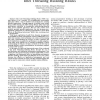Free Online Productivity Tools
i2Speak
i2Symbol
i2OCR
iTex2Img
iWeb2Print
iWeb2Shot
i2Type
iPdf2Split
iPdf2Merge
i2Bopomofo
i2Arabic
i2Style
i2Image
i2PDF
iLatex2Rtf
Sci2ools
118
click to vote
IISWC
2008
IEEE
2008
IEEE
Characterizing and improving the performance of Intel Threading Building Blocks
Abstract— The Intel Threading Building Blocks (TBB) runtime library [1] is a popular C++ parallelization environment [2][3] that offers a set of methods and templates for creating parallel applications. Through support of parallel tasks rather than parallel threads, the TBB runtime library offers improved performance scalability by dynamically redistributing parallel tasks across available processors. This not only creates more scalable, portable parallel applications, but also increases programming productivity by allowing programmers to focus their efforts on identifying concurrency rather than worrying about its management. While many applications benefit from dynamic management of parallelism, dynamic management carries parallelization overhead that increases with increasing core counts and decreasing task sizes. Understanding the sources of these overheads and their implications on application performance can help programmers make more efficient use of available parallelism. C...
Related Content
| Added | 31 May 2010 |
| Updated | 31 May 2010 |
| Type | Conference |
| Year | 2008 |
| Where | IISWC |
| Authors | Gilberto Contreras, Margaret Martonosi |
Comments (0)

